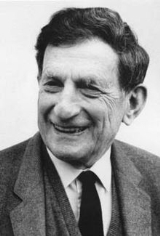David Joseph Bohm FRS (20 December 1917 – 27 October 1992) was an
AmericanThe United States of America is a federal constitutional republic comprising fifty states and a federal district...
-born
BritishThe British are citizens of the United Kingdom, of the Isle of Man, any of the Channel Islands, or of any of the British overseas territories, and their descendants...
quantumQuantum mechanics, also known as quantum physics or quantum theory, is a branch of physics providing a mathematical description of much of the dual particle-like and wave-like behavior and interactions of energy and matter. It departs from classical mechanics primarily at the atomic and subatomic...
physicistA physicist is a scientist who studies or practices physics. Physicists study a wide range of physical phenomena in many branches of physics spanning all length scales: from sub-atomic particles of which all ordinary matter is made to the behavior of the material Universe as a whole...
who contributed to
theoretical physicsTheoretical physics is a branch of physics which employs mathematical models and abstractions of physics to rationalize, explain and predict natural phenomena...
,
philosophyPhilosophy is the study of general and fundamental problems, such as those connected with existence, knowledge, values, reason, mind, and language. Philosophy is distinguished from other ways of addressing such problems by its critical, generally systematic approach and its reliance on rational...
,
neuropsychologyNeuropsychology studies the structure and function of the brain related to specific psychological processes and behaviors. The term neuropsychology has been applied to lesion studies in humans and animals. It has also been applied to efforts to record electrical activity from individual cells in...
, and the
Manhattan ProjectThe Manhattan Project was a research and development program, led by the United States with participation from the United Kingdom and Canada, that produced the first atomic bomb during World War II. From 1942 to 1946, the project was under the direction of Major General Leslie Groves of the US Army...
.
Bohm was born in
Wilkes-BarreWilkes-Barre is a city in the U.S. state of Pennsylvania, the county seat of Luzerne County. It is at the center of the Wyoming Valley area and is one of the principal cities in the Scranton/Wilkes-Barre metropolitan area, which had a population of 563,631 as of the 2010 Census...
, Pennsylvania to a
HungarianHungary , officially the Republic of Hungary , is a landlocked country in Central Europe. It is situated in the Carpathian Basin and is bordered by Slovakia to the north, Ukraine and Romania to the east, Serbia and Croatia to the south, Slovenia to the southwest and Austria to the west. The...
Jewish immigrant father and a Lithuanian Jewish mother. He was raised mainly by his father, a furniture store owner and assistant of the local
rabbiIn Judaism, a rabbi is a teacher of Torah. This title derives from the Hebrew word רבי , meaning "My Master" , which is the way a student would address a master of Torah...
. Bohm attended
Pennsylvania State College (now The Pennsylvania State University)State College is the largest borough in Centre County in the U.S. state of Pennsylvania. It is the principal city of the State College, Pennsylvania Metropolitan Statistical Area which encompasses all of Centre County. As of the 2010 census, the borough population was 42,034, and roughly double...
, graduating in 1939, then attended the
California Institute of TechnologyThe California Institute of Technology is a private research university located in Pasadena, California, United States. Caltech has six academic divisions with strong emphases on science and engineering...
for a year, and then transferred to the
theoretical physicsTheoretical physics is a branch of physics which employs mathematical models and abstractions of physics to rationalize, explain and predict natural phenomena...
group directed by
Robert OppenheimerJulius Robert Oppenheimer was an American theoretical physicist and professor of physics at the University of California, Berkeley. Along with Enrico Fermi, he is often called the "father of the atomic bomb" for his role in the Manhattan Project, the World War II project that developed the first...
at the
University of California, BerkeleyThe University of California, Berkeley , is a teaching and research university established in 1868 and located in Berkeley, California, USA...
, where he eventually obtained his doctorate degree.
Bohm lived in the same neighborhood as some of Oppenheimer's other graduate students (
Giovanni Rossi LomanitzRoss Lomanitz was an American physicist.He was born in Bryan, Texas and grew up in Oklahoma. His father was an agricultural chemist and named his son after the Italian socialist Giovanni Rossi, who had founded an agricultural commune in Brazil in the 1890s...
, Joseph Weinberg, and Max Friedman) and with them became increasingly involved not only with physics, but with
radical politicsRadicalization is the process in which an individual changes from passiveness or activism to become more revolutionary, militant or extremist. Radicalization is often associated with youth, adversity, alienation, social exclusion, poverty, or the perception of injustice to self or others.-...
.

![]()
![]()
![]()

